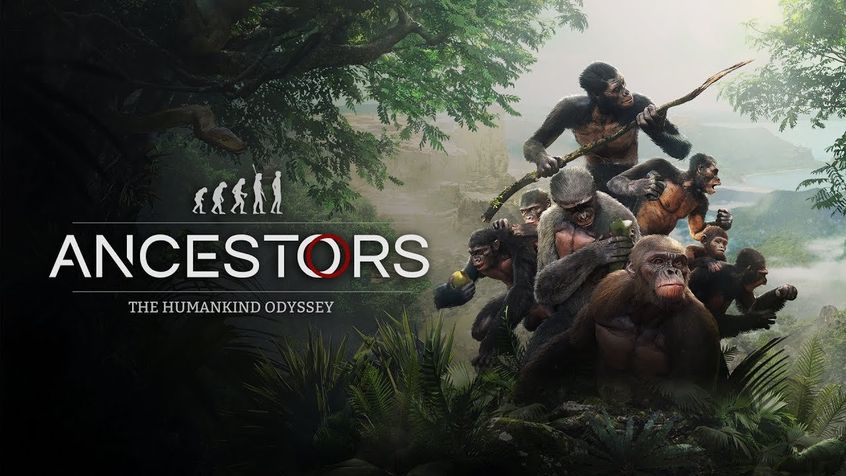Ancestors
Imagine with me, if you will, a game that combines platforming with twitch mechanics and unseen obstacles, while also investing heavily in theme and atmosphere without investing in story. Picture it. Turn it over in your mind.
Did you picture Ultimate Chicken Horse? Because I did, even though I was supposed to picture Ancestors. Look, many games are very similar, and while Ancestors may have a different theme than most games - and indeed, not technically be a platformer - the resemblance is uncanny.
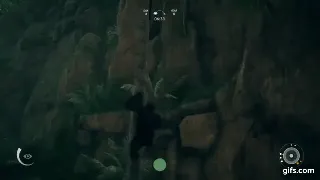 I love it when I’m only mostly joking.
I love it when I’m only mostly joking.
Ancestors follows the story of a particular genetic lineage of human ancestors as they struggle for survival in the Ice Age jungle. The player - and by extension, the hominid they are playing - learns to make tools, sharpen their senses, and puzzle their way through a highly interactive landscape, replete with things to climb on, delicious morsels, and predators to flee. It has a wide open world, ready to explore, and a whole clan of hominids, ready to explore it.
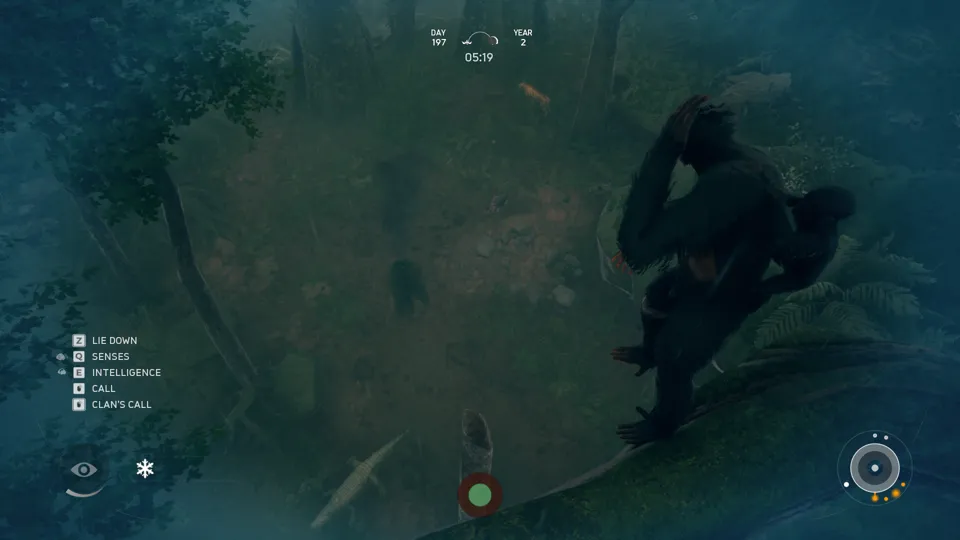 Pictured: Me exploring my options to get away from a crocodile and tiger
Pictured: Me exploring my options to get away from a crocodile and tiger
Ancestors is a game without a plot. Ostensibly, it’s telling the story of human evolution, but in reality, it plays like a game where you are an ape exploring a jungle. You sample your environment, finding what’s usable and not, learn about it, map it, and that’s it. This isn’t a bad thing, but there does come a point where the magic of the exploration breaks, and you’re left with the reality that you are about to get eaten by a tiger for the third hominid in a row. There comes a point where the exploration alone is not enough to carry the game, however beautiful the scenery and music may be.
Happily, the game does have a slightly more complex set of mechanics; however, these are not without issues. While the game has evolution mechanics, I found them clunky and difficult to navigate. Similarly, I spent most of the game giving my best guess as to what various icons meant. Jumping is, as you can see in the above gif, always a leap of faith as to whether or not I’d get to where I’m trying to go, assuming I could get on the branch I wanted to be on in the first place. Combat mechanics, too, are clunky and rarely did what I expected.
At first, I was happy to play this off as me learning the mechanics alongside my hominid avatar. While they struggle to survive, I struggle to push the correct button on my computer while eating popcorn. Definitely shared understanding there.
However, after the third attempt at rescuing a baby ended with me jumping through a tree I thought was solid and plummeting to my death below, I decided standing in solidarity with my hominid friend wasn’t working. It wasn’t a matter of learning the controls - the difficulty of the controls and unpredictably of where they would lead was immersion breaking and making the game difficult to play.
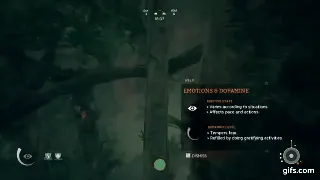 This is fine.
This is fine.
Fundamentally, Ancestors’ biggest selling point is its immersion. Evolution aside, it’s just fun to play as a hominid roaming the jungle. The sense mechanics feel natural, and like a reasonable way to explore the world. I wanted to get lost in the jungle, and that I played so much of this game is a testament to how immersive it can be. It has a dedication to detail that I admire.
It is, though, a game about evolution. It starts with a long prelude about human ancestors, and about what the player is about to simulate. One of the very first things a player sees is:
 A screenshot from Ancestors
A screenshot from Ancestors
The game is very clear that it is not meant as a scientific representation of human evolution, but given its dedication and immersion, I found the biggest mechanic, the primary driver of what is meant to make this game unique, baffling in its unscientificness and lack of care.
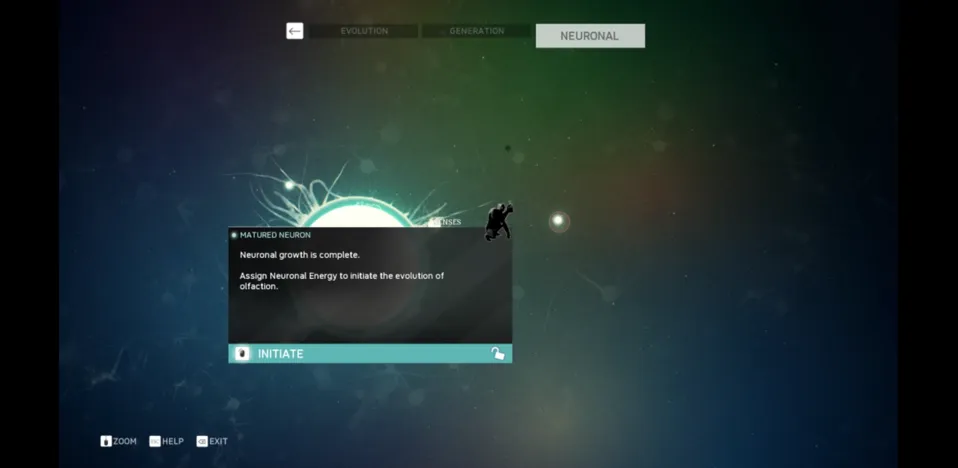 A sample of the evolution mechanic
A sample of the evolution mechanic
This is going to come off as nitpicky and against game design, but hear me out. One of my biggest issues with Ancestors is that, for all of its emphasis on realism and providing a (mostly) accurate simulation of human evolution, does not understand evolution.
Evolution, in a nutshell, is the process by which a species changes due to natural selection. Species evolve based on their environments, external pressures, and any number of things that could impact that species’ ability to live its life. Crucially, though, if there is no pressure or mutation that is more advantageous, a species won’t change much (think of crocodiles, turtles, and horseshoe crabs, many of whose modern species are largely the same as their primeval ancestors).
In Ancestors, what is my external pressure? These hominids can bounce around the jungle for hours, perfectly able to survive, perfectly adapted for the environment in which they find themselves. I gain the ability to develop new skills not because there’s a need, but because I use a skill, and then can spend neuronal points to improve it. I can then choose which of these points gets passed on to the next generation, but ultimately, all of it is optional, as there’s no reason to do it except to satisfy my own desires as a player.
The evolutionary model in Ancestors is not Darwinian. Passing on traits that were gained through experience is not Darwinian evolution - it’s Lamarckian, and while I don’t expect Ancestors to be a perfect model of scientific accuracy, when there is no reason to engage with one of the core mechanics, that is a big drawback from the game.
Indeed, the version of the human origin story that Ancestors best models is not evolution, Darwinian or otherwise. If anything, it’s a game about divine intervention. Independent of pressure, a finger touches the button that grants intelligence, meaning, and a soul to creatures who were otherwise on their own path. You, as God, step in and forge these hominids into what they should be. It’s as anti-evolutionary a game as I think I’ve played in a long time, and that it’s prefaced by “Inspired by True Events” leaves me with absolute disappointment.
Evolution is hard to model in a game, though, and to be fair to Ancestors, I thought long and hard about a game that effectively does so. There are board games that are very good at this - Evolution and Bios spring to mind - but for video games, these are few and far between. Spore, for all its flaws, still does a better job modelling this, as it relies on mechanics of needing to change to survive.
What I’d offer, though, is that, while games about evolution that successfully model evolution are rare, the concepts themselves are not. In every game that has a level system that allows you to choose traits or perks, there is a certain degree of very microevolution happening. The character must “evolve” to adapt to their increasingly hostile environment, and the traits that are chosen are those that are, ostensibly, best for that survival. These aren’t games that are trying to model grand species evolution, but the concept of “only the best builds survive” is at play, and that makes all the difference.
In Ancestors, there is no impetus to change, no reason to evolve, except to see what happens. It has the veil of evolution, but behind it is still just divine intervention. For a game about human evolution and ancient ancestors, I found myself less feeling mesmerised by the human story, and more just exploring an increasingly simulated and hollow world. The human story is a fascinating and fantastic one, but Ancestors doesn’t begin to do it justice.
Developer: Panache Digital Games
Genre: Survival
Year: 2019
Country: Canada
Language: English
Play Time: 40 Hours
